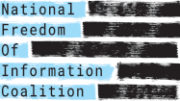When can journalists and the public see footage from police body cameras?
How can some law enforcement agencies withhold certain types of records while others make them available?
What do cops and prosecutors mean, exactly, when they say you can’t have a record because it would be “contrary to the public interest” to give it out?
Are they really allowed to charge $12 for one piece of paper?
The Colorado Criminal Justice Records Act (CCJRA) isn’t as well known or as well understood as its sister statute, the Colorado Open Records Act (CORA). That’s why the Colorado Freedom of Information Coalition assembled a panel of experts to discuss the law that governs the release of criminal justice records in Colorado – and to provide tips and workarounds for helping you get the records you want.
Our 90-minute panel at KUSA-TV last Wednesday evening featured: John Ferrugia, 7NEWS investigative reporter; Qusair Mohamedbhai, civil rights attorney; Sara Neel, attorney for the American Civil Liberties Union; Rich Orman, senior deputy district attorney for the 18th Judicial District; and Noelle Phillips, Denver Post crime reporter.
As he did last year, 9NEWS anchor Kyle Clark moderated CFOIC’s special event for Sunshine Week.
A video of this 90-minute conversation, including questions from the audience is available below. Download the handout: CFOIC Tip Sheet – Getting information from criminal justice records
Thank you to Kyle, the panelists and our sponsors, KUSA-TV and Colorado Press Women. Thanks also to 9NEWS photojournalists Anna Hewson and Manny Sotelo for recording the event.
Follow the Colorado Freedom of Information Coalition on Twitter @CoFOIC. Like CFOIC’s Facebook page. Do you appreciate the information and resources provided by CFOIC? Please consider making a tax-deductible donation.




